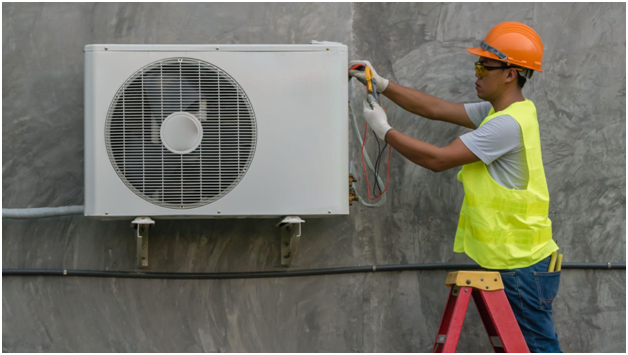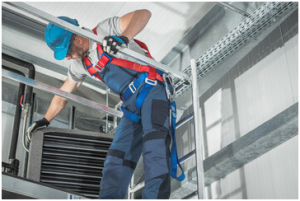
We all like to stay comfortable at work and home year-round. HVAC technicians make this possible by providing equipment and services that meet our needs. Unlike some careers that are experiencing downsizing, HVAC careers keep growing and expanding.
What An HVAC Career Is All About
HVAC technicians provide heating, cooling, ventilation, and refrigeration equipment and services to homes and businesses. Those starting their first jobs typically work in the residential sector and with experience can move into commercial or self-employment work.
Preparation for an HVAC career consists of earning an associate degree from a technical college. Through work experience and professional certification, technicians can advance to working on projects without supervision. When qualified, they can advance into supervision or management jobs. Technicians provide a variety of services depending on their employer.
- Provide equipment and system inspections and troubleshooting services
- Repair or replace system components, devices, and equipment
- Install equipment, devices, and systems in new construction projects
- Remove old equipment, devices, and systems and install ones
- Advise customers on the use of their systems
- Sell annual service contracts for systems
- Work in retail sales of HVAC systems
What You Will Learn And Achieve In HVAC Training
 Air Conditioning, Refrigeration, and Electrical Technology (AOS) is a program that trains students to work in cooling, heating, ventilation, refrigeration, and electrical careers. The 24-month associate degree program provides knowledge of and skills training in:
Air Conditioning, Refrigeration, and Electrical Technology (AOS) is a program that trains students to work in cooling, heating, ventilation, refrigeration, and electrical careers. The 24-month associate degree program provides knowledge of and skills training in:
- Heat transfer
- Refrigerants
- Electricity
- Ventilation
- Safe work practices
- HVAC regulations
- Troubleshooting issues
Emphasis will be placed on electrical training on circuitry, electrical safety, motor controls, programmable log controllers (PLCs), national electrical code (NEC), wiring methods, and lighting. Students will learn some PC office applications, computer networking practices, workplace communication, and choose a specialty elective course.
Students will learn the basics of working with all types of heating, cooling, ventilation, and refrigeration equipment and systems. They will be trained in classroom lectures, laboratory experiences, field trips, and working on real-world equipment and tools.
| “Unlike some careers that are experiencing downsizing, HVAC careers keep growing and expanding.” |
What Employers Want In HVAC Technicians
Employers want HVAC technicians with a broad overview of the industry. They want them to have a working knowledge of the basics of all common types of equipment and systems. HVAC technicians need a combination of soft and technical skills to perform their daily responsibilities. Specifically, they need the following technical (hard) and soft skills:
- Ability to understand blueprints and electrical drawings
- Effective communication and customer service skills
- Troubleshooting, critical thinking, and time-management skills
- Mechanical skills including hand and power-tool experience
- Attention to detail and computer skills
Soft skills also include a good work ethic, appropriate attitude, teamwork, and leadership abilities where needed. Technicians must be able to understand and follow work orders and follow-up assignments. They may be asked to order parts, devices, and equipment and put them into inventory upon arrival. HVAC technicians must be able to lift and move large and heavy objects to and from work sites.
HVAC Career Paths
 HVAC program graduates have several options when choosing career paths. Most technicians work as trainee on residential projects in their first jobs. With experience and certification, they can take on more responsibility and work alone on advanced projects. Typical paths are:
HVAC program graduates have several options when choosing career paths. Most technicians work as trainee on residential projects in their first jobs. With experience and certification, they can take on more responsibility and work alone on advanced projects. Typical paths are:
- Residential Repair
- Commercial repair
- Industrial repair
- New residential construction
- New commercial construction
- New industrial construction
- Refrigeration specialist
- Ventilation specialist
- Sales of equipment or service contracts
Once qualified, technicians may move into supervision, management, or self-employment opportunities. There are also positions available in technical estimating, service dispatcher, project management, purchasing, inventory control, safety management, and shop maintenance.
According to the U.S. Bureau of Labor Statistics (BLS), jobs are expected to grow 6% annually from 2022 to 2032 which is faster than average. This translates into 23,000 new jobs during this same period. The 2022 median pay was $53,190 per year or $24.71 per hour.
How to Prepare For An HVAC Career
Preparing for an HVAC job and career begins with earning an Associate of Occupational Studies (AOS) Degree at an accredited technical college. You will gain the essential knowledge and skills in an Air Conditioning, Refrigeration, and Electrical Technology Program.
The college’s admissions representative and career services office will steer you in the right direction with their professional services. You will receive advice on preparing resumes, interviewing skills, and job searches.
For more information about graduation rates, the median debt of students who completed the program, and other important information, please visit our website at: https://iticollege.edu/disclosures/




